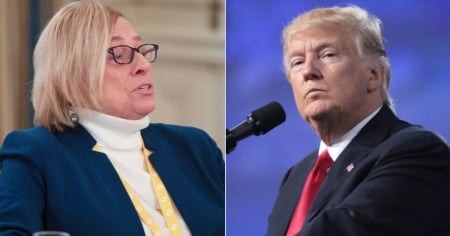The government of President Donald Trump has reversed its decision to suspend federally funded legal services for unaccompanied migrant children arriving in the U.S.
The measure, initially announced on Tuesday, generated a wave of criticism from human rights organizations and activists, who warned about the risks minors face when left without legal representation in immigration proceedings.
The suspension affected a program designed to provide legal assistance to children who arrive alone in the United States across the border with Mexico, without the company of parents or legal guardians.
This decision forced the halt of operations for various organizations that provide legal assistance to these minors, including those who "are so small that they wear diapers or whose legs dangle from the chairs in court."
However, this Friday the federal government communicated to the involved groups that they could resume their activities.
According to the Acacia Center for Justice, one of the main affected organizations, the government notified them that "it had reversed its previous decision."
The official notice from the Department of the Interior, obtained by the Associated Press, was clear but brief: “The Acacia Center for Justice may resume all activities.”
The notification did not provide a detailed explanation regarding the reason behind the revocation of the suspension.
The importance of the legal program
The program in question, backed by a $200 million contract, allows Acacia and its subcontractors to provide legal representation to approximately 26,000 migrant children, as well as to offer legal education to an additional 100,000 minors.
Shaina Aber, executive director of Acacia, stated that her organization will continue to collaborate with the government "to ensure that these crucial services that uphold the basic rights to due process for vulnerable children are fully restored."
But he also emphasized that this is a critical time to ensure that "no child is forced to navigate the immigration system alone."
Public concern over the suspension was immediate and strong.
According to Acacia, more than 15,000 letters were sent to the United States Congress in less than 48 hours demanding the resumption of the legal program for these minors.
The program is funded by a five-year contract, although the federal government has the ability to decide at the end of each fiscal year whether to renew it or not.
The deadline for making the decision for this year is in March, which keeps the uncertainty surrounding the future of legal support for these migrant children.
Despite the lifting of the suspension, concerns persist among immigrant rights advocates.
Michael Lukens, executive director of the Amica Center for Immigrant Rights, a subcontractor of Acacia, expressed his concern: “I am very worried because the attack on children is unprecedented.”
According to Lukens, if the initial order had been upheld, it "would have left children across the country without due process or protection."
The legal framework that protects migrant minors
The protection of unaccompanied migrant children in the United States is supported by existing laws, such as the Trafficking Victims Protection Reauthorization Act of 2008, which mandates that the government must facilitate legal representation for minors undergoing deportation proceedings.
However, the law does not require that each child automatically has an assigned lawyer.
These minors, being under 18 years old, have the right to apply for asylum, juvenile immigration status, or specific visas for victims of sexual exploitation, depending on their individual circumstances.
Additionally, the temporarily revoked program also affected the Flores Judicial Settlement of 1997, which sets standards for how minors in federal custody should be treated.
This agreement has been questioned by several administrations, including those of Barack Obama, Donald Trump, and Joe Biden.
Despite the controversies, it remains a legal pillar that protects the basic rights of migrant minors, ensuring they receive adequate legal assistance.
The legal assistance that these children receive mainly comes from nonprofit civil organizations funded by government resources. These organizations are responsible for ensuring that children can "navigate within the framework of due process in immigration and defend their rights to remain in the United States."
Wendy Young, president of the organization Kids in Need of Defense, urged the government to stay the course, noting that "the decision to restore funding ensures the continuation of vital protections for vulnerable children."
Frequently Asked Questions about the Revocation of Immigration Measures by Trump
Why did the Trump administration revoke the suspension of legal services for migrant children?
The Trump administration decided to lift the suspension of legal services for migrant children after receiving criticism from human rights organizations and activists. The initial measure left minors without legal representation in immigration proceedings, which sparked significant public concern and led to 15,000 letters being sent to Congress requesting the program's reinstatement.
What is the importance of the legal program for migrant children?
The legal program is crucial for providing legal representation to unaccompanied migrant children, protecting their basic rights to due process. Funded with a $200 million contract, the program ensures that about 26,000 children receive legal assistance, in addition to providing legal education to another 100,000 minors.
What other immigration measures has Trump taken during his second term?
Trump has adopted a tougher approach to irregular immigration, including the elimination of Humanitarian Parole, the reinstatement of the Migrant Protection Protocols, and the resumption of border wall construction. He has also ordered the designation of certain groups as terrorist organizations and has cut federal aid for undocumented immigrants.
How does the elimination of Humanitarian Parole affect migrants from Cuba, Haiti, Nicaragua, and Venezuela?
The elimination of Humanitarian Parole complicates the legal entry of migrants from these countries into the United States. Previously, parole provided a legal pathway to enter the country, deterring illegal immigration. Now, without this tool, migrant communities face greater uncertainty and potential detentions or deportations.
Filed under:
